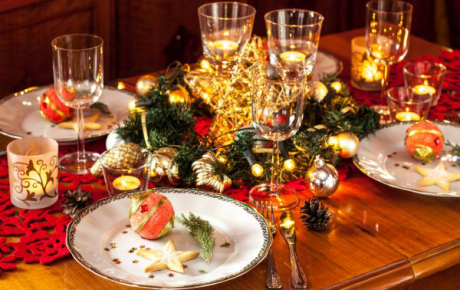Engagement in preparing Christmas meals
Engagement of the youngest children in the organization and preparation of the festivities makes them feel like they are an important part of Christmas. Depending on age, it is worth asking children to participate - using their creativity – in Christmas menu preparation, shopping or help while preparing the meals, making pierogis (dumplings), uszka (small and twisted version of pierogis. Older children may help laying the table or cleaning. This sort of activity not only will help in boosting the digestion, but also will take away the attention from constant eating. Duties will develop care and concern towards others and will show the child as a very diligent person among the householders. Moreover, it is worth noticing that children’s engagement in Christmas preparation it’s a perfect time to create priceless memories.
Nutrition education
Christmas is also a great time for small nutrition education. Most parents struggle to interest their children with meal preparation. Encouragement to prepare Christmas meals for all the family is a good excuse to familiarise children with tradition and introduce slight changes in a way of preparing the meals. Parents are responsible for the quality of prepared meals and by being a good example, they teach them to make healthy choices. Introducing few healthy changes in a traditional way of preparing the food will improve the quality of consumed meals. It is worth-mentioning that children who struggle with overweight and obesity, should not be treated differently. Excluding them might cause their instability, prompt them to “steal” sweets as well as lower their self-esteem, even be a cause for eating disorders development. Christmas is the time when all the family should eat healthy. No one in the family should have a “special diet”, everyone should eat nourishing and tasty food.
Dietician’ Christmas tips
Emotions connected with Christmas time cause us to exceed our standard serving portions, especially on big, family events. In the Christmas madness, when we “eat with our eyes”, plates become packed with food, exceeding the regular portions of food. This concerns both older and younger people. It´s good to remember to eat a rational meal portion size. Try not to overeat.
Meals should be prepared by cooking, braising, baking in parchment paper or foil pouch. Deep-fry should be limited – light meals will be easily digested and will not stay in our organism.
It is worth adding natural or Greek yoghurt to salads, or simply combine both mayonnaise and yoghurt altogether (in proportion 1:1). This practice will help to completely eliminate the mayo in the future. Using lean meat will make the traditional meals such as bigos (hunter’s stew) lighter. It can be prepared on a delicate chicken or turkey meat, or sirloin steak.
Family activity
Christmas time is usually associated with rest. Free days from school, work are spent with limited amount of activity. However, it´s a perfect opportunity to go for a walk and meet with the family or play football with them.
PSS Dietary Consultant, Erwina Szymczyk











